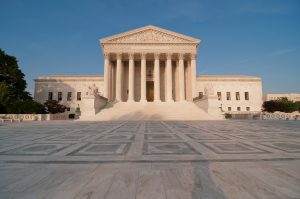PRO: Trump’s Nominee Qualified, Should Be Confirmed

President Trump poses with Supreme Court Justices.
October 1, 2020
It is important in deciding what people believe to know the rules and processes applying to what one is talking about. To become a Supreme Court Justice, one must first be nominated by the sitting president. Then the Senate Judiciary Committee collects relevant information both for and against the nominee. After all the evidence has been presented, the committee will decide whether or not to recommend the senate to appoint the nominee. After that, the Senate debates and votes on the confirmation. Then the Senate votes for or against the nominee. The one with a simple majority wins.
There are claims that nominating and approving Donald Trump’s nominee is unprecedented. It is not. Historically, there have been 29 instances of a Supreme Court vacancy during an election year. Ten of those instances had a senate of the opposite party and in six the president nominated a justice. In all but one, the Senate did not approve the nomination. In the other 19 instances, the Senate and President were from the same party. Ten of those had a nomination before the election and 9 were confirmed. Historical precedent shows that, in almost all cases, the Senate will approve the justice in an election year if they are from the same party and will not if they are from opposite parties.
In 2016, President Barack Obama nominated Merrick Garland to fill the late Justice Antonin Scalia’s Supreme Court seat. Senate majority leader Mitch McConnell did not allow a vote for Obama’s pick. However, today McConnell will allow a vote for Trump’s nominee to fill
Ruth Ginsburg’s seat. Opponents of this claim allowing a vote is hypocritical. It is not. Not only does the historical precedent follow these events, but McConnell’s reasoning is consistent. In 2014, the Republicans gained a majority in the senate. This showed that the American people were moving in a Republican direction. This means the Senate had a duty to check the other branches from doing things the American people would not support. This includes the Supreme Court Nomination. In 2018, unlike in 2014, the American people voted for a Senate that was in line with their President. This allows the Senate to push for the policies that are in line with the President, including approving his nominee.
President Trump nominated Amy Coney Barrett to the Supreme Court on September 26. She graduated from Rhodes College Bachelor of Arts magna cum laude, top 10-15% of her class, and was inducted into Phi Beta Kappa, the oldest and most prestigious honor society in the United States. She then went to Notre Dame Law School to study law and graduated first in her class with a Juris Doctor summa cum laude. She was a clerk for the late Justice Scalia while he was in the Supreme Court. She later became the Professor of Law at Notre Dame, receiving the “Distinguished Professor of the Year” award three times.
In 2017, President Trump nominated her to the US Court of Appeals for the Seventh Circuit. In her Senate hearing, she was questioned about whether her religious views would affect her judgment. Barrett explained how It is never appropriate for a judge to impose that judge’s personal convictions on the law. Sen. Dianne Feinstein later said in that hearing that “the dogma lives loudly in you.” This was seen by many, including Barrett and former Sen. Orrin Hatch who was on that committee, as an attack on religious people, saying they cannot be impartial because of their religious beliefs. Barrett responded saying that many judges have strong religious beliefs that do not affect their judgment and she would do the same. Barrett is an originalist judge. Originalists believe judges should follow what the constitution says and not create laws from the bench.
Barrett has ruled in cases that show us her beliefs and values as a judge. In Kanther v. Barr, Kanther was convicted of mail fraud and was barred from owning a firearm. The court ruled to uphold the barring, however, she dissented stating that non-violent felons should be able to purchase firearms and should not be treated as second class citizens. This shows us her Constitutionalist mindset and support for the second amendment.
In Doe v. Purdue, John Doe filed a suit against Purdue University for discrimination based on sex and deprivation of due process. The college found Doe guilty of sexual assault without interviewing the victim, using an admission of guilt he never made, and not allowing him to present evidence of his innocence. Doe lost his ROTC scholarship, was expelled from the ROTC, and suspended for one year. Barrett ruled that the college discriminated against Doe under title IX and deprived him of due process. This shows us again her constitutionalist mindset and support of the due process.
Barrett also dissented on a case that ruled an Indiana law banning abortion based on the babies’ race, sex, and disability of the fetus and also banned fetuses from being disposed of as medical waste as unconstitutional. She stated in her dissent that “None of the Court’s abortion decisions holds that states are powerless to prevent abortions designed to choose the sex, race, and other attributes of children.” This shows us some of her beliefs on abortion and states rights. However, if given the chance to overturn Roe v. Wade, she might not because she practices stare decisis. That means she bases her decisions based on past precedent made by the court.
Barrett needs to be approved by the Senate for the justice seat because she is highly qualified, has a great history of ruling in favor of the constitution, and won’t legislate from the bench. We must message our Senators, Sen. Richard Shelby and Sen. Doug Jones, telling them to confirm Barrett because she deserves the seat and not vote against her because of perceived hypocrisy or being nominated by the wrong party. Fill the seat.



